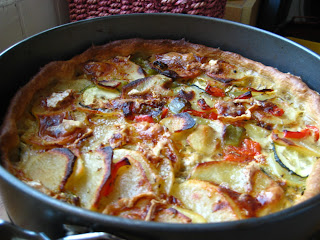Sometimes, the mental associations play unexpected links, which are actually
difficult to understand. For some reasons when I think to a quiche Lorraine I
immediately project the image of the Arthurian knights:
 |
| I would warmly suggest to read Chrétien de Troyes' Perceval |
Circular preparations (such as pizzas,
cakes and pies) are somewhat addressing that corner of my intellect that stores
all the memories related to sharing food:
the perfect shape of a pizza, for instance, grants equal slices: the regular
number of the portions mirrors the equilibrium of the circle.
 |
| This picture comes form another interesting blog, Ciao Italia, helpful for those who wish to learn some Italian: http://italiaitaliano.blogspot.co.uk/2011/01/ecco-la-ricetta-della-pizza-margherita.html |
Sharing food then is more than a simple act
of allowing other people to benefit of what is yours. Sharing food (or making a
food-gift) is something deeper: there is feeding in it of course, but especially
taking care. As when you water a
plant you do not ask for a reward, you merely feel to do it, because it gives
you pleasure, the reward is melt inside the action. You do not make food then to entertain or to be complimented for:
these two aspects clearly enflame the ego, but only are a surface of the whole
problem. On this point, unfortunately, I am often misunderstood. A real gift should never expect reciprocity:
it should be a gesture of kindness that you feel spontaneously driven out of
your heart, unconditionally and totally.
According to my personal etiquette: who often shows up to parties with empty
hands (or just with too symbolic items) spoils the inner idea of donation (unless he
has a very good excuse!) The gift is an
offer of our time, which is irreplaceable, a time that won’t ever come
back again. Who doesn't free his time for others is possibly a person too retreated in himself/herself: therefore he/she sees others as functional tools. On the contrary, the use of Time - our precious source - is an honour: it is a mean somehow to
substitute us with something tangible and eatable. This "something" brings inside the body calories, as a tender embrace does. In the moment in which the entity is
offered, the action of offering retires, as a sunset that leaves the memory of
its splendour.
 |
| Scott Peck was an eminent psychiatrist who died in 2005, the link he draws between time and life, possibly derives from Heidegger. His major book, written in 1978, is called The Road less Travelled: http://www.amazon.co.uk/Road-Less-Travelled-Arrow-New-Age/dp/0099727404/ref=sr_1_1?ie=UTF8&qid=1351291416&sr=8-1 |
So, let’s finally come to the simplified quiche. This recipe melts together a French tradition and that
of the Italian torta salata. I sincerely prefer
the pastry of the quiche, but I feel
the filling tends to be too heavy, because of the abundance of cream. At the
barbecue, this quiche became the perfect
appetizer, to control the rising appetite. As often happens, the famished and voracious friends groped
the quiche to the last breadcrumb, a ransack that is also a compliment. Nonetheless, I was left with a rescued tiny bit, which gave me at least the
pleasure a final personal opinion: Antony, for instance,
behaved like a mountain lion aware of its
strength, as Homer would phrase it. The quiche was, especially for me, an excuse to
prepare something smart for Michelle, who’s often looked down during these
carnivorous events. Isabel & John (who brought an amazing seed bread) and Kathy (who's also a refined chef) showed a great interest in the
preparation and this post is meant to pass them the legacy of the recipe.
 |
| One triple word: appetizing, rich, and piebald. |
I
|
II
|
III
|
200 gr spelt plain flour
100 gr unsalted organic butter
70 ml of ice cold water
a pinch of Maldon salt
|
200 gr plain white flour
90 gr unsalted organic butter
1 small organic egg
10 ml of organic whole milk
a pinch of salt
|
225 gr of white flour
100 gr unsalted organic butter
40 ml of whole organic milk
a pinch of smoked Maldon salt
|
I am in debt with Pasta, amore e...fantasia! for the proportions of the first of these
variations, although in the original recipe the flour wasn’t spelt flour:





No comments:
Post a Comment